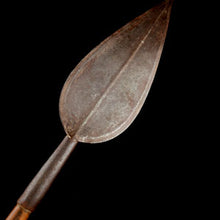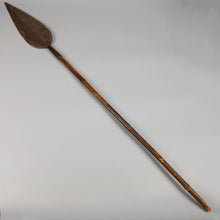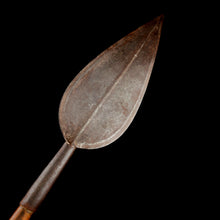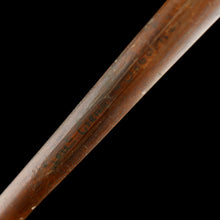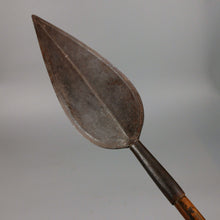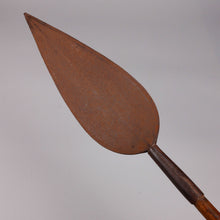Re-Conquest of the Sudan Battlefield Relic - Hadendoa Spear, 1898
Adding product to your cart
Length: 128cm (50.5in)
Provenance:
2/Lt H.P. Creagh-Osborne, 1st R. Warwicks
Iron and wood. Large leaf shaped head, typical of the Beja tribal group, on wooden haft bearing the period inked inscription ‘Lieut. Creagh-Osborne’ for Second Lieutenant H.P. Creagh-Osborne, 1st Royal Warwickshire Regiment.
The Westminster Gazette war correspondent E.N. Bennett reported on the effectiveness of such weapons in the following terms, ‘The large Dervish spear when properly handled is a most formidable weapon, and if a thrust is driven well home into the body, the wound from the broad iron head is so wide and deep that a man has little chance of recovery.’
Read more
Lieutenant-Colonel Herbert Pearson Creagh-Osborne OBE (1875-1947), late King’s Own Royal Lancaster Regiment, was born at Simla, the son of Lieutenant-General Charles Creagh-Osborne. He was Queen’s Honorary Cadet at Sandhurst and was commissioned into the 1st Battalion, Royal Warwickshire Regiment in 1895. He was soon on active service with 1st Warwicks when the battalion was brigaded with the 1st Lincolns, 1st Seaforths and 1st Queen’s Own Cameron Highlanders under General Gatacre in Kitchener's Reconquest of the Sudan of 1896-98. Creagh-Osborne kept a diary during the campaign, variously recording a lack of fresh food - 'We had no eggs, butter, milk or vegetables for 8 or 9 months’ and detailing his company’s speed in filing bullets to make Dum-Dums at a rate of eight ammunition boxes a day. On 8 April 1898 Gatacre’s ‘British Brigade’ attacked the Dervish camp at the confluence of the Nile and River Atbara, and defeated the army of Osman Digna after 45 minutes of fighting. On 2 September 1898 Creagh-Osborne was present in the decisive battle of Omdurman where Kitchener's reinforced army of 8,200 British and 17,600 Sudanese - Egyptians fought an army of 52,000 Dervishes. The unfortunate Dervishes were mown down by artillery fire, Maxim guns, and overheating rifles firing Dum-Dum bullets, losing 9,700 killed, 13,000 wounded against British loses of 47 killed and 340 wounded.







